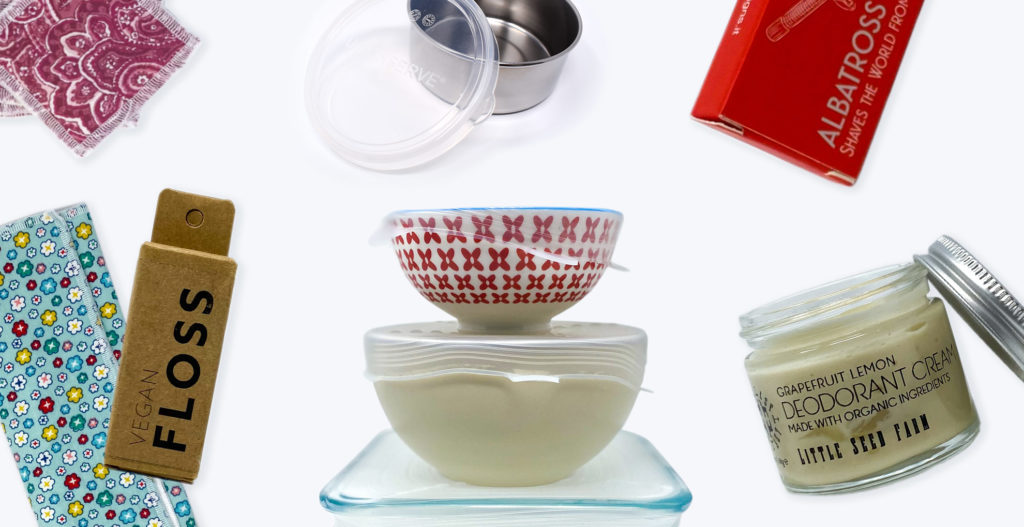It’s an undeniable fact that many of the disposable products we use every day are incredibly convenient and practical, making our busy lives easier. Whether at home or in the office, in a shared kitchen or private bathroom, the ability to cook, clean, and take care of our personal hygiene is something that no one wants to compromise on, and for many of us, single-use plastics and other non-recyclable materials appear to be unavoidable.
However, for anyone with a concern for the environment and human health, it’s becoming increasingly difficult to ignore the shocking amounts of waste generated by these products—particularly in light of the fact that recycling may not be the solution to our challenges. There comes a time when the most commonly used items and everyday conveniences should be judged on whether the benefits outweigh the harm they cause.
It’s actually not as difficult as you may think, and no one is suggesting that you should give up brushing your teeth simply because you can only find plastic toothbrushes at your local grocery store—you do have options, and there’s a wealth of zero-waste alternatives available today to help you enjoy all the conveniences you’ve become accustomed to without contributing to the local landfill.
So, whether you’re feeling bad about throwing things away after a single use, or you’ve made great gains minimizing your waste at home but have hit a plastic roadblock, we’re here to round up seven major items you may use every day and introduce you to the best zero-waste swaps.
Plastic Wrap and Wax Paper
Source: zerowaste.com
Plastic wrap might seem like a miracle invention: Its slim profile belies what a heavy-duty workhorse it has become in the kitchen, covering the tops of containers, wrapping up leftovers, and protecting from messes. Yet cling film is very difficult to recycle and releases the toxic chemical dioxin when incinerated with other trash. In short, it is the very worst kind of plastic waste around.
As a traditional alternative, wax paper is an eco-friendly product that can be used for some of the same purposes as plastic wrap. Unfortunately, it doesn’t create an air-tight seal and may not always be compostable. There are, however, two great zero-waste alternatives to plastic wrap apart from wax paper.
Reusable Silicone Dish Covers are a great place to start, forming an integral part of the best zero-waste kitchen collections. This example is available in six sizes and they are ideal for use with your existing Tupperware or any other type of container, stretching over the top to create an airtight seal to keep your food fresh. They are also microwave-safe and can easily be washed so you can use them countless times without them falling apart.
Another item that is popular and effective is beeswax wraps. Made of cotton and hemp cloths coated with natural beeswax and other oils, these Reusable Beeswax Food Wraps can be used for wrapping up sandwiches, rolling tubes of cookie dough, and many other tasks where you would normally rely on plastic wrap.
Resealable Plastic Bags
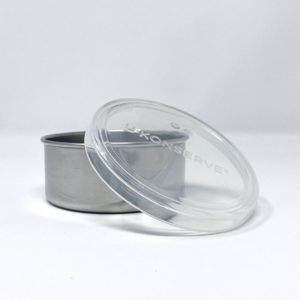
Source: zerowaste.com
Resealable plastic bags are another kitchen mainstay, but how many times does anyone really wash and reuse them? Similar to plastic wrap, resealable plastic bags are difficult to recycle and need to be brought to a specialist recycling point rather than disposed of in the plastic recycling bin at home.
A durable zero-waste alternative to plastic bags is metal or glass containers with lids. For example, this Stainless Steel Container from UKonserve comes with a clear platinum-grade silicone lid that forms a tight seal, making it perfect for holding pretty much anything you’d normally store in a plastic zip bag. Because it’s stainless steel, you also don’t have to worry about it shattering in the freezer and, of course, it won’t tear.
Paper Towels
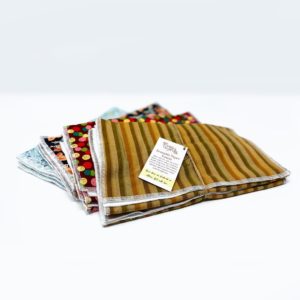
Source: zerowaste.com
Of all the foils to a zero-waste kitchen, paper products can seem the least problematic—they are, after all, fully biodegradable. Yet paper towels cannot be composted if they have come into contact with any non-organic substances, oil, grease, or cleaning products, and if you’ve been tossing them in with the normal trash, they end up landfilled or incinerated.
The obvious zero-waste alternative to paper towels is cloth towels. To take up the unenviable duties of a classic kitchen roll, a zero-waste alternative needs to be lightweight, absorbent, and durable. These Reusable ‘Paper’ Towels fit the bill perfectly and are made from upcycled fabric that is a combination of viscose bamboo, organic cotton, and polyester.
Deodorant
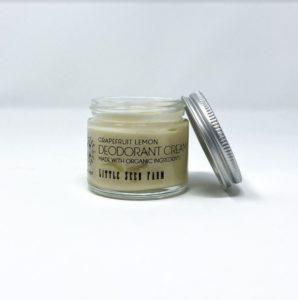
Source: zerowaste.com
Very few people are willing to go through the day without deodorant, but unfortunately, the vast majority of existing products and similar antiperspirants come in metal or plastic dispensers. To make matters worse, they are usually in multi-material packages that are near-impossible to recycle and rarely refillable.
The best zero-waste deodorant alternatives come in glass jars, like this Grapefruit Lemon Deodorant Cream from Little Seed Farm. A curved wooden scoop is included to apply the cream to your underarms, and a bamboo applicator is also available separately if you prefer to use another brand or make your own DIY deodorant at home.
Dental Care
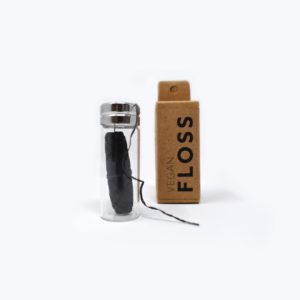
Source: zerowaste.com
Another all-important daily habit is brushing and flossing your teeth. A compostable bamboo toothbrush is an essential tool to reduce waste in your dental hygiene routine, but there’s no reason to stop there. Kick the other big plastic offender out of your bathroom and replace it with toothpaste in a glass jar, like this citrusy Zero Waste Toothpaste from Nelson Naturals.
Most dental floss comes in plastic packaging, but the truth is that the floss itself is usually plastic too. Nylon thread, which is nearly impossible to recycle, takes decades or even longer to break down in landfill, and has particularly unpleasant ramifications for marine life if it makes it out to the ocean.
Zero-waste alternatives to dental floss generally come packaged in glass and are made of waxed silk thread, which makes a great replacement for nylon but, isn’t an option for people who wish avoid animal products. Another option is this Vegan Floss that is made of 80% bamboo and 20% nylon, and although it’s not completely free from plastic, it is an excellent low waste product that vegans can use without compromise.
Makeup Wipes
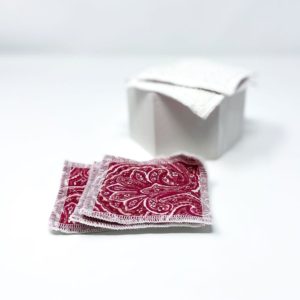
From old-school cotton balls to today’s disposable pads, these single-use items are indispensable as makeup removers or for applying skincare products. While cotton is a natural material, producing it takes a heavy toll on the environment, and most cotton pads don’t biodegrade properly thanks to the chemicals used within production.
But why use disposable cotton when there is plenty of cotton fabric that can be reused multiple times and can do the same job? For a more sustainable beauty routine then, items like Reusable Makeup Wipes are an essential zero-waste alternative to cotton pads. This particular product is made from decorative, upcycled cotton fabric and bamboo fleece which can be washed and reused repeatedly without having to worry about microplastics shedding from synthetic fibers.
Razors
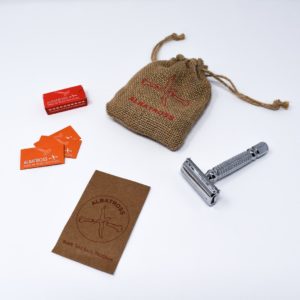
Source: zerowaste.com
While disposable plastic razors generally last between three and 10 shaves before they become unusable, there are other options available. Of course, you can reduce your plastic consumption by using razors with replaceable heads, but both the heads and bodies are made of a combination of materials that makes them difficult or impossible to recycle.
The zero-waste solution comes straight from your grandfather’s bathroom cabinet: a classic metal safety razor with replaceable blades that adds a touch of vintage class to your zero-waste lifestyle. The Flagship Butterfly Razor from Albatross is both stylish and functional, and the company even runs a takeback program where they collect used Albatross razor blades to then upcycle them into cutlery.
A shampoo bar or other bar soap can then be used as a zero-waste alternative to shaving cream, and package free lotion to soothe that razor burn and complete your waste-free personal care routine.
Today, as awareness of the scale of our waste problem continues to rise, consumers are increasingly demanding plastic-free alternatives that use natural ingredients, pushing manufactures to design and develop more eco-friendly products. This means that going zero waste no longer needs to be a compromise, and the convenience and practicality of the products we all know and love can be retained with just a few slight adjustments.
Check out our shop to explore other zero-waste alternatives and swaps for your home, and don’t forget to subscribe to zerowaste.com for more information on the zero-waste movement and how you can incorporate it into your home or business.
Stay tuned to the blog for more zero-waste tips for your kitchen, your bathroom, and the rest of your home. Additionally, subscribe to zerowaste.com today or chat with one of TRUE Advisors to get more insights on how your business can work towards zero waste.
*We only feature products that we recommend and believe help you on the path towards a zero waste lifestyle. This post contains affiliate links – If you click on an affiliate link and make a purchase, we may receive a small commission at no additional cost to you. See our full policy here.*

